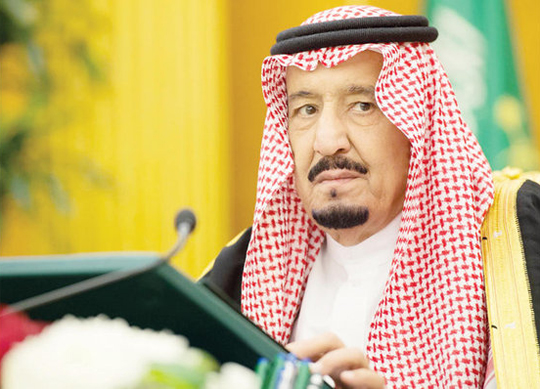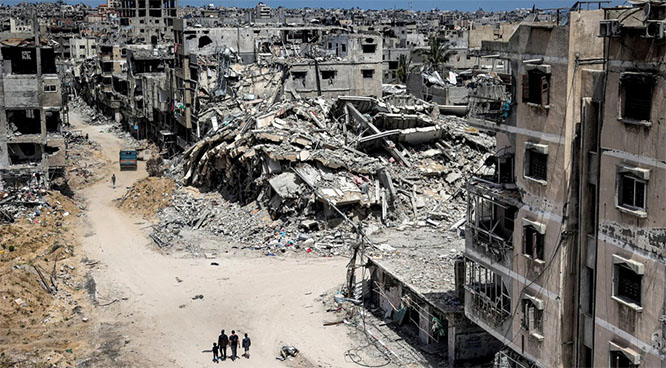Riyadh, Nov 22: The Council of Ministers, chaired by Custodian of the Two Holy Mosques King Salman, met in Riyadh on Monday and denounced the brutal shelling and heinous attacks on the Syrian people in Aleppo and its surroundings.

The Cabinet deplored the severe damage caused to people and property, particularly hospitals and schools.
The attacks resulted in the demolition of buildings and civilians being deprived of relief assistance.
The ministers noted that such attacks are contrary to the principles, values and essence of international law and humane principles in general.
The ministers reaffirmed the decisions of the emergency meeting of the foreign ministers of the Organization of the Islamic Cooperation (OIC) that the Kingdom would defend the Two Holy Mosques and enforce a strict call for putting an end to the practices of the Houthi militias and their supporters and their persistence in launching ballistic missiles at Makkah. These were unpredictable threats to Islamic sanctity and hurt the feelings of Muslims.
At the beginning of the meeting, the Custodian of the Two Holy Mosques briefed the ministers on the contents of messages he had received from Algerian President Abdulaziz Bouteflika and the outcome of his meetings and talks with Algerian Premier Abdulmalik Al-Sallal, Ethiopian Prime Minister Hailemariam Desalegn, Arab League Secretary-General Ahmed Abulghait, GCC Secretary-General Abdullatif Al-Zayani and Italian Interior Minister Engelo Alfano.
On reading the 52nd annual report of Saudi Arabian Monetary Agency (SAMA) for the fiscal year 2015, King Salman lauded the Kingdom’s vibrant financial situation which is attributed to strong security and stability in the country.
He also expressed his appreciation for SAMA’s efforts in the service of the country’s economy.
The Cabinet also hoped for a bright future in the forward march in accordance with the objectives of the Kingdom’s Vision 2030 and the national transformation program, (NTP) which will make a tangible economic impact through its diversification of national economic resources.
The Cabinet highlighted the statement made by Crown Prince Mohammed bin Naif, deputy premier and minister of interior, on the importance of protecting children from the threats of human society that harm their innocence and breach their dignity and honor.
The Kingdom’s hosting of the National Forum for Preventing Children’s Sexual Abuse on the Internet reflects its interest and care for human rights in general and children’s rights in particular based on the teachings of Islam.
The Cabinet was also briefed on the points raised by Deputy Crown Prince Mohammed bin Salman, second deputy premier and minister of defense, about his chairing of the 15th meeting of the GCC defense ministers, citing that everybody is looking forward to seeing the GCC move onward, particularly in the defense field amid the current challenges engulfing the countries in the region which necessitate more coordination and work and the taking of prompt action.
It was also briefed on the Kingdom’s stand at the UN Framework Convention’s 22nd Conference on Climate Change held in Marrakech.
It said that it would remain committed to its firm role in facing the problem of climate change and meeting the world’s oil energy needs and also providing support for a gradual transformation toward a more sustainable environmental future.
The Cabinet lauded the outcome of the conference.
Also highlighted was the Kingdom’s assertion at the Africa Labor summit that the GCC seeks fruitful cooperation at the Arab-African level for consolidating partnerships in order to achieve the objectives of UN sustainable development which was approved in New York in 2015.
The Cabinet also lauded the outcome of the 33rd GCC ministers of labor and social affairs held in Riyadh.
It cited the initiatives and programs envisaged to contribute effectively to a number of issues pertaining to the labor and social development fields, including the GCC joint common market.
The Cabinet praised the results of the first Arab Gulf Security exercise held in Bahrain where the Kingdom took part upon instructions of the Custodian of the Two Holy Mosques.
Later, the Cabinet approved the following decisions:
Firstly, the Cabinet authorized the crown prince or his delegated authority to discuss with the Zambians a draft cooperation agreement between the governments of Saudi Arabia and Zambia on the fight against terrorism, organized crimes and illegal trafficking in drugs and psychotropic items and their smuggling.
Secondly on the privatization of sports clubs in the Kingdom, based on recommendations of the Council of Economic Affairs and Development.
The Cabinet approved the following: privatization of sports clubs joining the Saudi championship for Premier Football League clubs.
The General Authority for Sports will, in coordination with the ministers of commerce and investment and economy and planning, stipulate regulations and conditions whereby the sports companies will carry out their activities.
Formation of a committee to supervise the completion of the club privatization stages to be headed by the president of the General Authority for Sports and members composed of the deputy minister of economy and planning, commerce undersecretary for systems and regulations in addition to representatives of the Finance Ministry, Saudi Football Association, and the Professional League Association.
Thirdly, the Cabinet approved a memorandum of understanding between the Saudi Ministry of Islamic Affairs, Call and Guidance and the Ministry of Islamic Affairs in Maldives in the field of Islamic affairs and endowments.
Fourthly, the Cabinet authorized the Minister of Islamic Affairs, Call and Guidance, or whomever he authorizes, to discuss with Djibouti a draft memo of understanding between the Saudi Ministry of Islamic Affairs, Call and Guidance and the Ministry of Islamic Affairs, Culture and Endowments in Djibouti in the area of Islamic affairs.
Fifth, the Cabinet authorized the Minister of Foreign Affairs, or whomever he authorizes, to discuss with the Independent Permanent Commission on Human Rights at the Organization of Islamic Cooperation (OIC) a draft head office agreement between the Saudi government and the Independent Permanent Commission on Human Rights at the OIC.
Sixth, the Cabinet approved the establishment of diplomatic relations between Saudi Arabia and the Republic of Central Africa at the level of “non-resident ambassador”.
The Cabinet also approved an agreement on the employment of domestic workers between the Saudi Ministry of Labor and Social Development and the Ministry of Public Office in Chad.
Finally, the Cabinet approved the establishment of a national program to maximize the benefits of government incentives in the energy and water sectors aimed at reducing consumption of energy and water in order to ensure economic efficiency in the productive sectors.






Comments
Add new comment